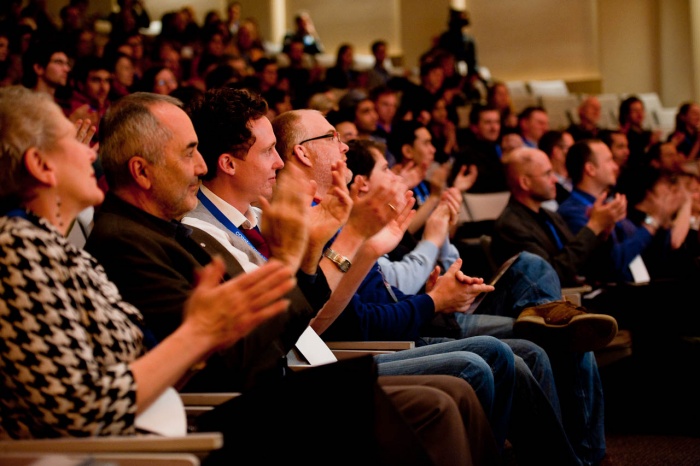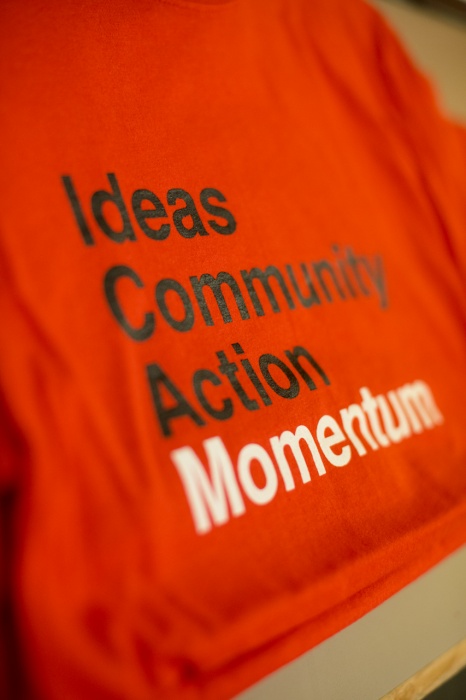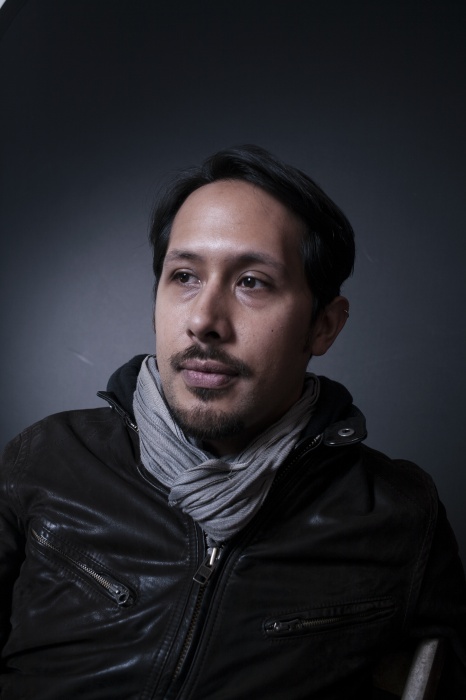Today, when we hear someone use the term “TED talk,” we know exactly what they’re referring to. We’ve all stumbled upon one of the quick and captivating video presentations as we’ve perused the internet. There are over 1,500 TED (technology, entertainment, and design) talks uploaded to ted.com, and with events happening frequently, as well as an active YouTube channel, the number of inspiring talks that are available online is growing at a rapid speed.

People involved in TED believe strongly that ideas have the power to change lives and attitudes, and they are committed to building a wealth of free knowledge for those full of curiosity or in need of inspiration. TED’s slogan, “Ideas worth spreading,” speaks directly to their mission and has become a reality, as TED talks have become globally widespread and extremely popular.
But why have they become so popular? Is it because of the rise in social media? Is it a sociological phenomenon? Or could it simply be a combination of dumb luck and good timing?
A brief history of TED
Although TED is now a well-known organization, it’s actually been around for a long time. It began in 1984 as a four-day conference in Long Beach, California and was focused on bringing together people of technology, entertainment, and design backgrounds. It was a fairly exclusive event that was only open to industry professionals and only allowed the video recordings from the event to be accessed by those who were present at the conference.
In 2002, journalist and publisher Chris Anderson became the curator of TED, and he had a very different idea of what he wanted the event to be. It was his vision to give the public the ability to be a part of the TED experience. He did this by shifting to an online distribution model for all of the videos of the talks given at TED conferences.
Since then, the TED organization has grown to include many events worldwide, including TEDx conferences, which are independently run events that offer communities an opportunity to stimulate conversation through a TED-like experience at the local level.
Dylan Wilks co-founded TEDx Victoria with Carol-Lynne Michaels, both Camosun and Nexus alumni, in 2010 (this year’s event is happening from 10 am to 6 pm on November 16 at the McPherson Playhouse). Their involvement in the past few years has given them first-hand knowledge as to how the rise in social media is responsible for the increasing popularity of TED.
“That’s what people do on the internet now, they just share,” says Wilks, adding that he remembers having to explain to people what TED was. “Whether it’s sharing things about themselves and their lives, with blogging or Tumblr, or status updates… Everybody is constantly sharing with each other now. What would they rather share than things that inspire them? And that’s one of the things that TED is brilliant at. There are a lot of talks from some incredible people that are just inspiring in the most incredible ways. So it’s taken off because it’s just the right time for that kind of thing.”
Camosun sociology professor Francis Adu-Febiri agrees that social media and the fact that the general population is now so digitally oriented has paved the way for the success of TED, and ideas conferences in general, but feels that it is merely the surface of the issue.
“The main issue is that our sociopolitical economy is changing,” explains Adu-Febiri. “We are moving from a post-industrial economy into what I would call a post-post-industrial economy. The previous economy was completely knowledge-based, whereas this emerging post-post-industrial economy is more focused on creative ideas. TED showcases creative ideas, and therefore is supported by the emerging economy.”

Blooming in restraint
One of the key factors in what makes TED conferences unique is the format in which the speakers present their ideas: they are given a strict time limit of 18 minutes. This poses a challenge for even the most seasoned public speakers. TEDx Victoria has decided to break away from the traditional 18-minute limit and tighten it even further, encouraging speakers to limit themselves to 10-12 minutes.
Wilks, who is acting as the creative director for this year’s event, says they did this for a few reasons. For one, they can get more speakers into the day. But there’s a deeper reason to it: he says that it challenges the speakers to make sure they are delivering their message as succinctly as possible.
“In the case of some of our speakers, they are trying to condense huge chunks of their doctoral thesis, or something that they would normally lecture for two to four hours, into this 10-to-15-minute chunk. Trying to articulate these complex ideas as effectively as possible to as broad of an audience as possible… that’s a huge challenge.
“The third reason has to do with natural attention span,” he continues. “Our current generation in particular is being bombarded with constant distraction, so assuming a talk isn’t what you had in mind, or doesn’t interest you in some way, if it’s 10 minutes long it can probably still hold your attention all the way through. But once you hit that 10-minute mark, you start to wander unless you’re really into it. We’re trying to get our audience to be able to absorb as much of the day as possible, and short talks really accomplished that.”
Adu-Febiri feels that the limit on presentation time would not hinder someone who has a formal education, as it is a common practice within the field to be quick and articulate.
“The time limit is not a new thing in academia,” says Adu-Febiri. “Academic conferences do it all the time. It stresses the need for a strong thesis, and if you really are connected with your material and know what you’re talking about, it shouldn’t be a big challenge.”
The presenters and performers for the upcoming TEDx Victoria event have gone through a minimum of one live rehearsal, up to as many as three, in order to perfect their delivery and ensure they are using their 12-minute window to the best of their ability. Wilks feels that the context of TED and the unique audience it attracts would make being a presenter a challenge for anyone, regardless of their experience.
“Delivering a TED talk is a world away from delivering a talk to your peers if you’re in a scientific field,” he says, “because your peers care about your research; they’re not interested in your personal story. But, a general audience? They want to know why you’re doing what you’re doing, and why they should care. So it’s important to articulate that part of the story.”

Emerging ideas
All of the presentations at this year’s TEDx Victoria event will have the theme of “emergence.” Each year the chosen theme is something that is open to interpretation in different ways and leaves room for the TEDx audience to come up with their own ideas about what it means. Wilks has a unique perspective on what emergence means to him.
“Emergence can mean anything from a flower growing out of the ground to a collection of ideas coming together and seeing what the emergent idea is,” he says. “Or even just collaborations between groups of people and seeing what comes out of it. It’s open to a lot of interpretation. And, for me, it’s the ambiguity that makes it such a wonderful theme, because so much can come from emergence. It could be looked at in so many different ways.”
There will be 15 speakers and two performers taking the stage at the upcoming event. Included in the list of speakers is Camosun business instructor Tom Rippon, who will be using his 12 minutes on the stage to talk about student debt, both locally and globally, and the need to bring about change in how education is funded.
Elementary school teacher Tiffany Poirier will also be speaking about education, but from a very different point of view. She is the author and illustrator of a recently published critical-thinking book for children entitled Q is for Question: An ABC of Philosophy. Her goal is to help children recognize their inner philosopher by teaching with enrichment programs within the public school system.
Poirier is approaching TEDx as a way to better understand the role of a teacher, and has found the experience has made her more thoughtful of how she spends her time in the classroom.
“It’s hard because as teachers you think your job is to get up there and expound your wisdom, but that’s not teaching, that’s lecturing,” says Poirier. “There’s a big difference. I don’t want to be a lecturer, I want to be a facilitator, so I’ve got to be silent and let the kids do their own thinking. TEDx has been a great boot camp for that.”
She admits that she is used to having the luxury of time while teaching, and she’s excited about being challenged by the need for efficiency in her presentation.
“I’m comfortable speaking,” says Poirier. ”But this is another whole realm of challenge and opportunity… because of the framework, because of the restrictions, because of the profundity of what could occur because of what we’re sharing.”
The focus of Poirier’s presentation is very closely connected to the message that TED, as an organization, is so committed to spreading. She is able to sum it up perfectly by explaining her desire to inspire inquiry in the people around her.
“People often think that changing the world and having big ideas is at a distance from them, and they can’t do it,” says Poirier. “What we forget is that ideas come from somewhere, as answers to questions, and we can always control the kinds of question we ask. If you don’t know what your idea worth spreading is, take inventory of the big questions that have been stirring in your heart.”
